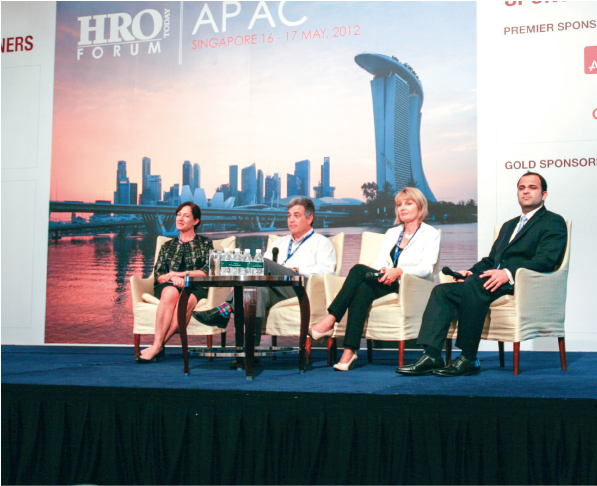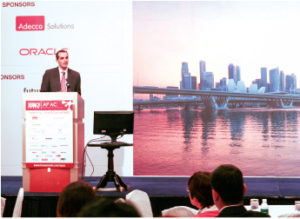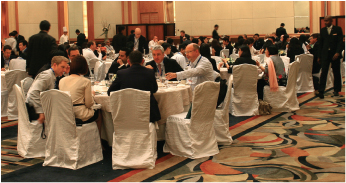
HR Magazine attended the HRO Today Forum, Singapore to find out about HR efforts across the APAC region.
The APAC HRO Today Forum attracted forward-thinkers to a uniquely collaborative environment of HR, consultancy and technology professionals. The event was held in Singapore on 16 and 17 May and proved a fruitful forum for consideration of the future of HR with a newly-globalised workforce. Hosted by SharedXpertise the programme was supported by HROA, the industry association for HR decision makers and providers of HRO related services.
Day one was devoted to buyers’ and providers’ forums in which both parties could freely share experiences across the region. Since Asia remains relatively inexperienced in the provision of outsourcing some unique challenges would doubtless present themselves whilst some lessons can be successfully learnt from Western counterparts. Inconsistencies between decision-maker and budget-holder will be commonplace as HR evolves from a transactional to strategic sphere of the business.
HR as ‘Agents of Change’
The official full-day forum comprised a number of sessions introduced by a welcome address from Elliot Clarke, CEO, SharedXpertise and Publisher of HRO Today Global. He opened with a hearsay take on the region’s reputation by citing Randstad’s current ‘Work Monitor Global Press Report’ which showed that 80% of employees in India and China had expected a pay rise in 2012 through either salary or bonus. In fact, he added, 20% were in the process of leaving as they filled out the forms. The conclusion—that 100% of workers in Asia actually expect a pay rise. Clark quipped that workers in the APAC region demanded payment merely for the inconvenience of filling in the survey. His point, of course, that salaries in Asia are inflating continually with resulting implications for HR professionals in terms of recruitment and retention. Couple this with further policy demands for mobility, family-friendliness, gender equality and flexi-hours and HR is challenged like never before. HRO, he considers, can provide the engines to drive change since it offers existing infrastructure and the latest technology. Furthermore outsourcing will reduce costs, increase technical capability and lower language and cultural barriers.
Until 2010, Clark continued, APAC companies could claim only 6% of all HR outsourcing projects. In the last two years this figure has risen to 19%, demonstrating rapid growth from recruitment, payroll and other outsourced services. He reasoned that APAC can show leadership to the rest of the globe through highly sophisticated systems. Unlike in more developed economies there is little or no existing infrastructure to destroy. An HRO solution can more easily be implemented on the blank canvas of APAC’s growing businesses.
Furthermore, Gen-Y with their unorthodox set of requirements will seek to fulfil them in Asia first. It could well be in HR’s interest to understand their outlook. Clark relayed a conversation from the night prior to the conference when an acquaintance had declared that sometimes, in order to expand horizons, it is advisable not to visit new places in the world but to see the world with fresh eyes. Global web access has increased in APAC by 190% since 2010 demonstrating the demand for anytime-anywhere access which will change the rules of engagement for HR and employees. HR, he suggests, can act as the agent of this change initiative.

Thorsten Barth, Director People and Change, PwC Services LLP, Singapore.
Success in a changing landscape
The first speaker was Thorsten Barth, Director People and Change, PricewaterhouseCoopers Services LLP, Singapore, who provided a picture of the new-HRO. According to PwC’s Global CEO Survey, CEO’s are two and a half times more likely to believe that emerging markets are more important to growth than developed ones and 90% of them anticipated the biggest growth to be from Asia. He delivered a set of factors to consider by asserting that the CEO wants:
- An agile and innovative workforce
- Leadership efficiency—ability to leverage growth
- Strategic expertise
- Transformational skills—from commodity to strategic thinking
Emerging markets have shown a 150% increase in capital production over the last eight years leading to growth in both the workforce and consumer base. As the trend in capital manpower production shifts to Asia so too does the decision making process. HR analytics and best practices should be shared amongst practitioners.
Barth left the audience with three questions for consideration:
- Are you a thought leader and pushing your organisation?
- Does your HRO strategy match your business plans for Asia?
- Are you prepared for the next HR?

Latifah Daud, Staffing Director, Honeywell Asia Pacfic.
Recruitment outsourcing
Next to the stand was Latifah Daud, Staffing Director, Honeywell Asia Pacific who provided an overview of Honeywell’s co-outsourcing within China in order to improve quality of service of the HR function whilst reducing cost. This resulted in consistent quality of hire results and better trained recruiters with longevity in retention and the provision of a more flexible workforce arrangement. She highlighted the challenges in undertaking this process by dividing the audience into five groups, each to consider one of the following:
- When/why would you consider outsourcing?
- Who are the internal stakeholders?
- Who are the external stakeholders?
- What will you measure?
- What will be the likely show stopper?
Daud pointed to the necessity of transparent, clear and consistent communications to HR Generalists and business leaders on the co-sourcing model. Any concerns raised by HRGs and business leaders must be addressed since the ability to work with each other and flexibility are critical competencies for a successful roll-out. The partner must be managed, experienced recruiters must be used and talents chosen should be known to be able to deliver.
A step-by-step guide to HRO
Calvin Richardson, Director HR Service Delivery, Corning International— APAC walked the audience through its outsourcing process with partner organisation Talent2. Corning has moved beyond RPO and is transitioning to a fully integrated and scalable talent acquisition model. Richardson drilled down from initial building of a business case to the eventual transfer of resulting knowledge from Asia operations back to the parent company. Since China was the first of eight countries to undergo the process the methodology was rolled-out to the remainder. Richardson kindly conveyed those pitfalls to be avoided and success factors that underpin a successful HR outsourcing partnership.
Think global, act local
Anthony Raja Devadoss, Vice President, APAC, Kelly Outsourcing and Consulting Group looked at how Asian businesses can tackle barriers to future growth. Much of the manufacturing boom, he explained, has been built on low-cost, disposable, short-term goods. Skills shortages are a constraint on most firms in the region, and are one of the major drivers of higher costs. Cost advantage is eroding and a culture is now developing in the East that values quality. Devadoss emphasised the importance of obtaining the right talent to shift from a cost focus to a quality focus and of providing a global culture whilst maintaining a local mindset.
Diving deep—economic and organisational transformation
The first Keynote Speaker was Johan Mahmood Merican, CEO, Talent Corporation Malaysia Berhad who led a session entitled ‘Addressing the Talent Needs of Economic Transformation’ since highly-skilled human capital is needed to drive the transformation to achieve advanced economy status by 2020. This was followed by a ‘deep dive’ panel discussion on the management of change implementation projects involving representatives from Mercer, PageUp People, Futurestep and Oracle Corporation and hosted by Think8.
Systems of change
Joint major sponsors Oracle demonstrated the latest cloud technology that integrates the HR key practices: recruiting, compensation, performance management and talent/succession coupled with powerful dashboards and analytics.
Co-sponsors Adecco introduced key challenges and then accurate and compliant solutions to support regional payroll initiatives, with an emphasis on legislative change and regional tax office audit activity. An overview was provided of the award-winning, data-driven approach for competitive intelligent mapping within the talent acquisition industry from Six Degrees.
Riding the T.I.D.E.S. of change
The final session consisted of the second keynote speaker Dr Graeme Codrington, Futurist, TomorrowToday with an analysis of the five disruptive forces to the world of work, bundled into the acronym T.I.D.E.S.
- Technology
- Institutional Change
- Demographics
- Environment
- Shifting societal values
Codrington claimed that riding on these tides of change would set a strategic agenda set to ensure organisational success in the next decade.




